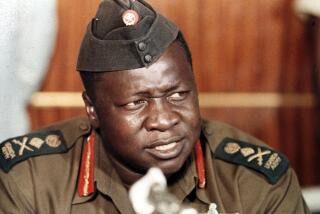Is a New Strongman Iraq’s Solution?
King Abdullah II of Jordan, our best friend among the Arab leaders, this week dismissed the White House promise to install a democratic system in Iraq and said that what Baghdad needed instead was a strongman, probably from the ranks of the military, to preside over the transition to a permanent government.
His words made me recall talks I had in Baghdad on the eve of the war, when Iraqis repeatedly told me that although the impending American invasion would surely put an end to the Saddam Hussein regime, it would produce in its place not democracy but a carbon copy of Hussein. They said this without glee but rather with resignation. Most did not want another tyrant, but they had no faith in democracy’s prospects or in Washington’s ability to impose it.
Abdullah, however, was not calling for the restoration of a Hussein-like regime. He suggested a hero of the Iran-Iraq war, tough but untainted by Baathism, a consensus figure. Though not washing his hands of democracy entirely, he reminded us that Arab tradition tilted more readily toward authoritarianism. He seemed to be looking Arab history straight in the eye and concluding that it was all but impossible for us to build a democratic system on the rubble of the Iraqi battlefield.
Painful as it is for Americans to lay democracy aside, the king may be right. Did our planners really think Iraqis would embrace democracy coming from the barrel of a gun?
Scholars differ on the long-standing reasons for democracy’s poor prospects in Iraq -- religious and ethnic divisions, tribalism, Islamic theology, social patriarchy. But what is undisputed is Iraq’s historical rage toward the West. The American vision of overriding that rage to design a state in our own image was never realistic, and the disorder fed by the occupation made matters only worse.
Iraq’s anger, rooted in centuries of Christian-Islamic rivalry, was reborn in earnest when Britain replaced Turkey as Iraq’s colonizer after the collapse of the Ottoman Empire in the wake of World War I. The Turks, who were both Middle Eastern and Muslim, had shared basic values with the Arabs. The British, who were Western and Christian, brought values that tore Arab society apart. It did not impress Arabs that Britain was governed democratically.
The British in Iraq organized a democratic regime, to be sure, but it was only a facade for safeguarding their own power. When they departed a few decades later, and the Arabs found themselves free to choose for themselves, they overthrew the pseudo-democracy that the colonizers had left behind and put a strongman in its place. By the time Hussein reached the top he was already known for brutality, but at least, in the eyes of Iraqis, he had none of the smell of the foreigner about him. To the end, Iraqis were proud to be ruled by one of their own.
Turkey was the one Muslim state in the region to opt for democracy, but under its own unique circumstances. The hub of a grand empire, it was often defeated in battle but never occupied by the Christian West. Used to making political decisions, it accepted the leadership of Kemal Ataturk, a strong-arm military man who preached that the country’s lost grandeur could be restored only by adopting the ways of its conquerors. Democratizing Turkey was no easy task, and today, 80 years after Ataturk took power, it is far from finished. But Turkey’s democracy has proved resilient.
Abdullah, though a strongman himself, is the model of a benevolent monarch. Both he and his late father, King Hussein, kept ultimate control of the state in their own hands while nudging the country toward Western values -- the antidote, in their view, to the Arab world’s economic and social stagnation. Although President Bush insists that it is condescending to say that Iraqis are unready for democracy, Abdullah clearly disagrees. He knows Arabs well enough to recognize the pointlessness of foisting on the Iraqis a democratic system before they are ready to embrace it on their own.
His proposal suggests a regime much like Ataturk’s and a little like his own, but, in the Iraqi context, it will not be easy to keep it from sliding into Husseinism.
Iraqis are no doubt aware of the danger. Yet if the current uprising tells us anything, it is not that they want a democratic or an Islamic or a military state but that -- whatever the price in blood and resources -- they want to be in charge themselves of the process of choosing.
Iraq may one day get to democracy, but not as an American gift. Iraqis will have to do it the hard way, getting there on their own.
More to Read
Sign up for Essential California
The most important California stories and recommendations in your inbox every morning.
You may occasionally receive promotional content from the Los Angeles Times.










